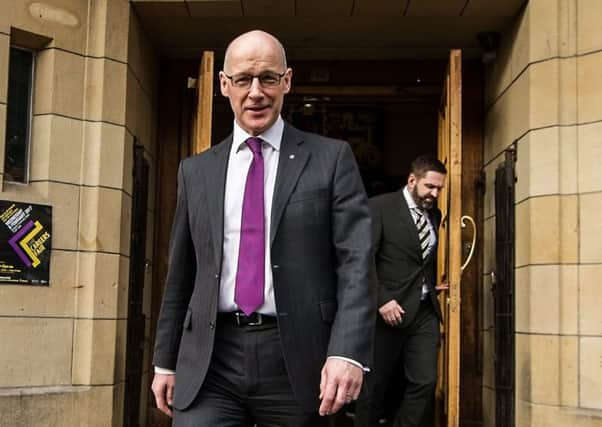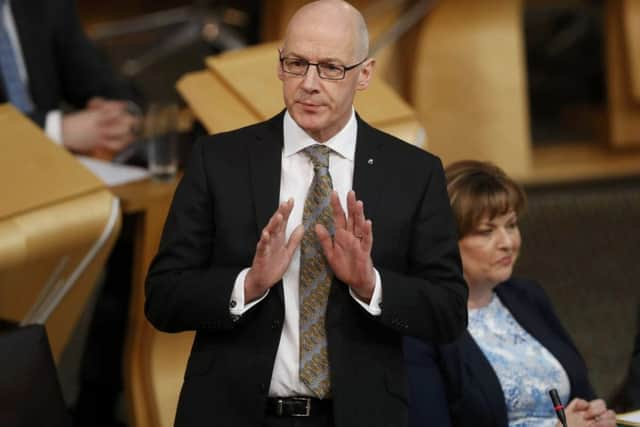Brian Monteith: Our children paying price for SNP failures


It was back in 2015 that the First Minister elevated education to be her government’s top priority and emphasised this pledge by appointing her safest pair of hands, John Swinney, to become the new Education Secretary the following year.
With literacy and numeracy standards visibly falling; with Scottish rankings in comparative international rankings dropping embarrassingly to below that of Vietnam; and with the number of pupils leaving schools without any meaningful qualification climbing, there will not be a time when a Scottish education secretary will be more empowered to introduce reforms.
Advertisement
Hide AdAdvertisement
Hide Ad

A more propitious moment to challenge the vested interests of the teachers’ unions and the local authorities – the two most conservative organisations hell-bent on maintaining their control of what happens in schools – could not be conjured up.
There was good reason to hope John Swinney, the erstwhile “good cop” to the First Minister’s “bad cop”, would deliver change.
He waxed lyrical about the status quo not being an option; he opened a consultation on the governance of schools and he encouraged parents and head teachers to dream of what they could do if schools were given more powers.


Last Thursday we finally found out that Swinney is a man of clay. Rather than devolve greater powers that would mean something tangible to head teachers he announced a bureaucratic concoction designed to look dynamic but which retains the real power in the hands of those who already hold it – his education department, unions and councils.
There will now be regional educational boards, not to replace local councils – but in addition to them. Yes, heads will gain control of teacher employment but the contracts will remain with the local authorities – meaning they will continue to be the real bosses.
Most disappointing is how John Swinney rejected submissions by three schools to become pilots on becoming directly funded by the Scottish Education Department and independent of their local authority. #Most notable amongst them was St Joseph’s Roman Catholic Primary School in Milngavie, threatened with closure by East Dunbartonshire Council.
It had submitted a business plan and has been waiting for some two years to hear if it was acceptable. On Thursday the school was called by a faceless civil servant to be told its fate. Its options for continuing to deliver a Catholic education are now very limited.
If there is anyone who still thinks John Swinney was born to lead and is the man best able to break the grip of the educational establishment and give genuine power to head teachers and parents then let me suggest a comparison is considered.
Advertisement
Hide AdAdvertisement
Hide AdStep forward one Michael Forsyth, the former Tory MP for Stirling and a man who loved being an education minister. Back in the eighties Scotland already had a good reputation for its education system – it was certainly viewed as being considerably better than what was on offer in England, but Forsyth was worried that it was in danger of falling behind and that significant reform was required.
Benefitting from his own toil at Arbroath High School and the University of St Andrews, Forsyth prized a good education as what provided everyone in society with the opportunity to excel and achieve their dreams.
Despite constant personal and bitter attacks by the teaching unions and the Confederation of Scottish Local Authorities – at a time when both were significantly more powerful than they are now – Forsyth went ahead and reintroduced statutory school boards that would give parents a real influence in the management of their respective schools.
He was accused of importing an “English” system of school governors but Scottish school boards had existed up until their abolition in 1928 and their return was long overdue if schooling was to become more accountable to those it served.
His most controversial move was to allow individual schools to seek to leave council management and become directly funded by the Scottish Education Department.
The Conservatives had already saved from closure Jordanhill, the demonstration school run alongside Jordanhill teacher training college in Glasgow by making it direct-grant funded – and it was showing this could be a success.
Now others could follow and next St Mary’s Episcopal Primary School in Dunblane took that opportunity and became self-governing. Its performance improved dramatically, encouraging other schools to consider the model.
Unfortunately for them the Conservatives lost the 1997 general election and Forsyth, by now Secretary of State, lost his seat along with all other Tory MPs.
Advertisement
Hide AdAdvertisement
Hide AdWhat followed next was one of the greatest examples of political spite in modern times as the new Scottish Parliament proceeded to dismantle every educational reform that Forsyth had introduced – emasculating the school boards, removing the opportunity for schools to leave council management, restricting the publication of school exam performances and abandoning tests that had provided parents with much-needed information about their childrens’ performance. All of these changes have been a major contributory factor in the subsequent decline of Scottish education.
Had Forsyth’s reforms been left alone it is not too extravagant to belief Scottish education would now be in a better place.
Parents would be able to exert greater influence than they are currently permitted; heads would know they could propose becoming independent and make a success of it, and the corresponding competition between schools and availability of information would have made our system more open and accountable.
In sharp contrast John Swinney has produced a fudge that leaves the establishment in control. Today Jordanhill continues to show how state schools can excel by managing themselves. The logic of Swinney’s new policy is Glasgow City Council should now manage it.
The one thing we can now say with certainty is that for the foreseeable future Scottish education, the SNP’s top priority, is likely to get worse before it gets a chance to get better.
Brian Monteith is editor of ThinkScotland.org
